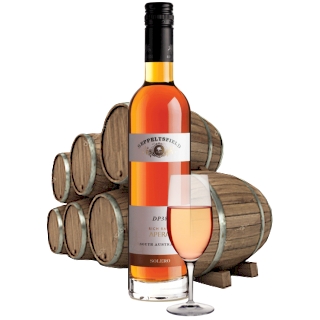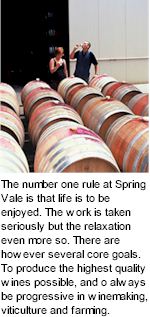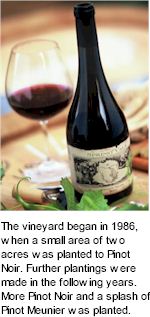


In October of 1826, William Lyne, his wife and five children arrived in Van Diemen's Land (now known as Tasmania.) Among the first of settlers, the Lynes gave names to features of importance to them, such as Christmas Point, at which they arrived on Christmas Day, immediately prior to taking up their land grant. Always a sociable family, they celebrated with their fellow settlers as soon as their first dwelling, a sod hut, was complete. Early life in the area held its fair share of challenges, which the Lynes and other pioneering families rose to meet. Further setting the scene for the continuing fascination with the East Coast of Tasmania was the early artist and author Louisa Meredith, herself the first resident of Spring Vale. From 1875, the Spring Vale property has been in the hands of the Lyne family, who have pursued farming ventures in this beautiful area on the East Coast of Tasmania.

Rodney and Lyn Lyne are the current owner/ operators of Spring Vale. Rodney manages the farm and vineyard - a never-ending task which sees few spare weekends present themselves. He steers the ship with Lyn as counsel and support. Lyn is a retired primary school teacher of 25 years who has shown great enthusiasm for farming and viticulture, giving Rodney her full support and assistance.
Continuing in the tradition of hard work and innovation established by William Lyne in 1826, Rodney and Lyn have planted 6.6 hectares of wine grapes at Spring Vale, principally Pinot Noir. The vineyard began in 1986, when a small area of two acres was planted to Pinot Noir. Further plantings were made in the following years: firstly, more Pinot Noir, then Chardonnay and Gewürztraminer, followed by Pinot Gris in 1996. In 2000, more Pinot Noir and a splash of Pinot Meunier was planted.
In June 2007, Spring Vale purchased a neighbouring farm, Melrose. The purpose of this purchase was to enable decent amounts of a lighter red to be produced, with the first Melrose Pinot Noir being the 2008 Vintage. The acquisition of "Melrose" brings the total production in a normal year to 120 tonnes. There are plans in place to plant more Pinot Noir, Pinot Gris and Pinot Meunier in 2009, which should push production closer to 200 tonnes.

The number one rule at Spring Vale is that life is to be enjoyed. The work is taken seriously but the relaxation even more so. There are however several core goals. To produce the highest quality wines possible. To promote the Freycinet Coast and Tasmania as food and wine destinations. To promote the Freycinet Coast and Tasmania as super-premium Pinot Noir regions. To retain and expand customer loyalty by maintaining high quality, good value wines. To preserve the qualities that make family businesses unique and rewarding. To always be progressive in winemaking, viticulture and farming.
The Freycinet Coast is the driest part of the state, with an average annual rainfall of 550mm. Irrigation is therefore essential. The entire vineyard is drip irrigated. For frost protection, overhead sprinkler systems are employed, while one block has a wind machine to blow away the cold air. The soil at Spring Vale is mostly a fertile clay loam, with the subsoil varying from porous friable loam with rock to medium-heavy clay. Drainage is excellent throughout the vineyard and the pH of the soil is around 6.5. A modified Lyre ("U-shaped") trellis system is used in conjunction with vertical shoot positioning (VSP), while the block planted in 2000 has a simple VSP trellis. "Melrose" is entirely VSP. All vineyard operations are carried out manually - pruning, shoot positioning, leaf plucking and harvesting.
Both the Spring Vale homestead and the cellar door building are heritage listed. The cellar door is actually a stable, which was built by convict labour in 1842. The stable has been preserved (with minor restorations necessary) and is now a unique cellar door building with a very historic feel. In the same room, a modern Macrocarpa pine bar and wooden wine racks have been installed, to offer a great mixture of old and new.
